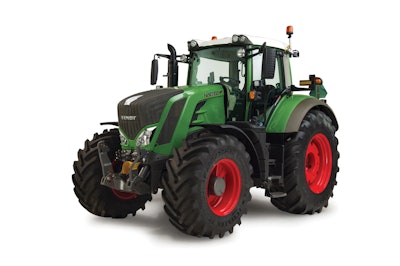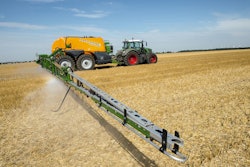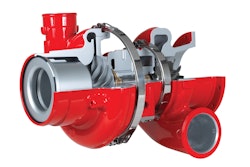
Fendt, a worldwide brand of AGCO, Your Agriculture Company, introduces the new 800 and 900 Series tractor lines, two four-model families designed for farmers supporting high-intensity dairies and feeding operations to large, broad-acre row crop and small grain farms. Fendt tractors are unique in delivering a total package, a total system that makes both the tractor and operator faster, more efficient and more productive.
The new 800 Series line is made up of the models 822 (220 hp), 824 (240 hp), 826 (260 hp) and 828 (280 hp). The new 900 Series family includes the 927 (270 hp), 930 (300 hp), 933 (330 hp) and 936 (360 hp, available only in Canada).
“The 800 and 900 lines represent the latest generation of Fendt high-horsepower tractors featuring cutting-edge technology and attention to ease of use and efficiency in the field,” says Conor Bergin, Product Marketing Manager for High-Horsepower Tractors. “The new six-cylinder Tier 4 Final engines in these lines offer growers more horsepower, better torque curves and improved fuel efficiency, all the while meeting and exceeding today’s stringent clean-air standards.”
The enhanced X5 cab features a host of new features aimed at making long hours in the cab more comfortable and efficient for the operator. Growers can also choose productivity-boosting options including front hitch, front PTO or VarioGrip, which provides from-the-cab control of front and rear tire pressure. The new hydraulic system offers 40- to 54-gallons-per-minute flow and supplies the power steering system, eliminating the auxiliary power steering pump and conserving horsepower.
The Fendt 800 and 900 Series tractors will be on display at the 2014 National Farm Machinery Show, February 12 to 15, in Louisville, KY. (Lots 9014 and 9034 — east end of South Wing B).
More efficient power
The engines feature twin turbochargers for optimum low- and high-speed-intake air boost, improving engine performance characteristics and reducing fuel consumption. A new three-pump fuel injection system maintains 29,000 psi pressure in the common rail, which feeds fuel injectors capable of multiple discharges of properly atomized fuel per ignition event. The boost and precision fuel injection are responsible for improving fuel economy and low-RPM torque.
A new cylinder head features improved metallurgy and a new valve seat angle for improved breathing and cooling for more efficient fuel use. New all-steel pistons and new oil-cooling modules have been added to further help the tractors dissipate wear-inducing heat and improve durability.
These power plants use a combination of selective catalyst reduction (SCR), cooled exhaust gas recirculation (cEGR) and a coated soot filter (CSF) to meet Tier 4 Final emissions requirements. This solution provides maximum engine efficiency and lowest total operating cost. New diesel exhaust fluid (DEF) tanks are integrated conveniently into the fuel tanks.
Up front, a new and enhanced cooling package includes the engine radiator, a transmission oil cooler, a new intermediate intercooler for the twin turbochargers, the intercooler itself and the air-conditioning condenser. All are located ahead of the engine under a new hood with an increased opening angle for easy access and maintenance. Behind the cooling package is a new optional reversible, electronically controlled-pitch fan. The direction of the airflow can be reversed to blow out debris and crop residue that may build up on the front grill in adverse conditions. The reverse feature of the fan can be controlled manually or automatically through the Varioterminal in the cab to precisely meet the cooling needs of the engine. “This is perfect for dusty conditions and tasks like triple-mowing,” says Bergin.
High-efficiency hydraulics
A new central control block is the heart of the hydraulic system for the 900 Series, which features double-connect-under-pressure couplings with new sealing gaskets. The system is protected by a pressure sensor in the return-flow filter, and the hydraulic oil change interval has been raised to 2,000 operating hours or two years, so growers spend more time working and less on maintenance. “When we enhanced the hydraulic system, our engineers eliminated the auxiliary power steering pump and powered that system with the main hydraulic pump instead,” explains Bergin. “This small change reduced parasitic losses by 2.7 hp.”
Front hitch and PTO
The new 800 and 900 Series tractors feature an optional comfort front three-point hitch with position control and load relief control. The system is easily controlled through the Varioterminal in the cab, and offers much gentler tool handling. In mowing applications, this system provides a more accurate cut to harvest higher yields, all while protecting the front implement and field.
Growers can opt for the factory-installed front PTO, which turns a 21-spline shaft counterclockwise at 1,000 rpm. The front PTO, which meets North American ISO standards, provides growers time and cost savings by offering the ability to use a variety of front and rear implement combinations.
VarioGrip keeps the pressure right
Growers who select flange axles can also add the VarioGrip system, which allows them to adjust front and rear tire pressures from the cab. The system uses the vehicle’s own valve and air-guiding assemblies to supply increased or decreased pressures through proprietary durable radial rotary unions on the front and rear axles. Two pressure settings for the front and rear axles can be saved in the Varioterminal and recalled later, allowing an operator to run low pressures for reduced compaction and increased traction in the field, and higher pressures when the tractor is back on the road for better fuel efficiency and less tire wear.
Improved operator comfort and visibility
A host of new features greets operators in the 800 and 900 Series cabs, adding up to a level of comfort customers expect from Fendt. An improved seat design with an external compressor and redesigned dash display makes long hours in the cab more efficient, while a new mobile phone bracket keeps communication at the operator’s fingertips in the field. The cab also features a new heated, laminated windshield and a segmented windshield wiper with 180- and 300-degree wiping for safety and visibility.
The 800 and 900 Series also benefit from a state-of-the-art lighting system with Bi-LED for high and low beams with headlamp leveling. Work and corner lights are also fitted with LED bulbs, providing growers with precise control of illumination and visibility to the implement, even in the dark.
Precision readouts
The Varioterminal 10.4-B provides growers a single access point to all information and controls for the tractor, implement, guidance and documentation. The 10.4-inch terminal is the second generation of touchscreen terminals from Fendt. The new design has a smartphone look and feel, and it features greater contrast for better readability.
Growers can monitor up to four applications simultaneously and the new terminal bracket permits a high degree of adjustment for improving operator comfort. The Varioterminal 10.4-B also features connections for two color cameras and boasts VarioDoc and VarioDoc Pro functionality.
Load Limit Control 2.0
Load Limit Control 2.0 enables adjustment of the transmission ratio based on a percent of engine speed drop. Fully automatic mode adjusts ratios based on target ground speed or engine load. Operators can also utilize the manual settings for more hands-on control when conditions warrant. “Load Limit Control 2.0 provides higher average speed and lower fuel consumption,” Bergin notes. “It is the perfect blend of power and fuel economy.
“Fendt tractors are especially appreciated by operators for their comfort, power and ease of use, and the eight new models continue that Fendt tradition through the most exacting attention to details and coordination of countless individual measures,” Bergin concludes.

















